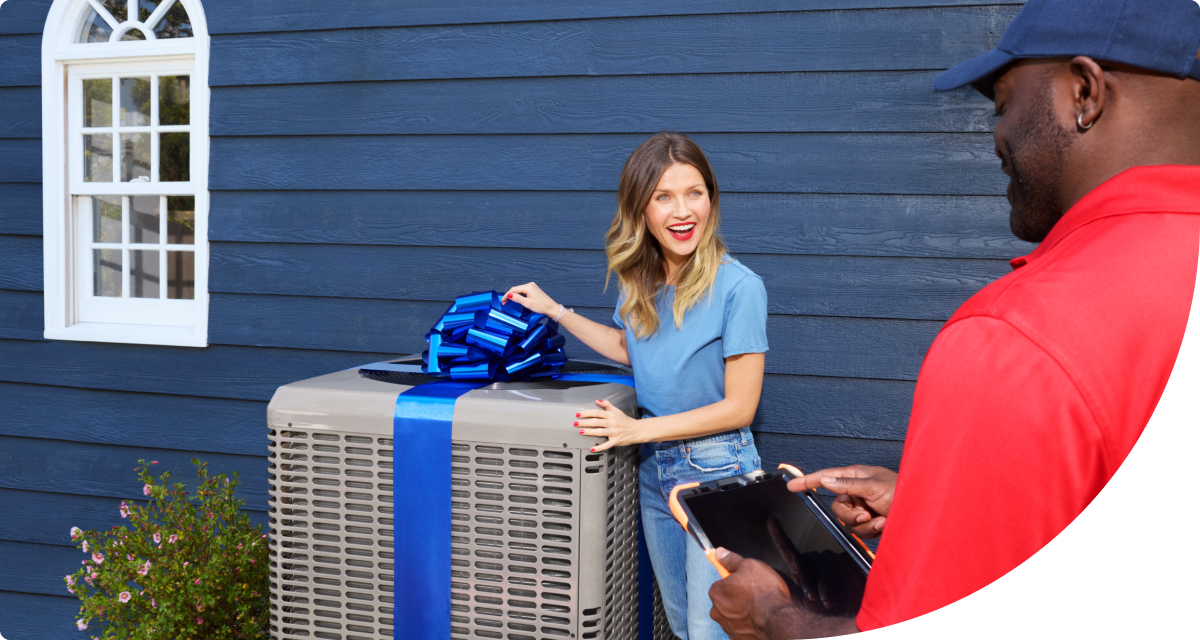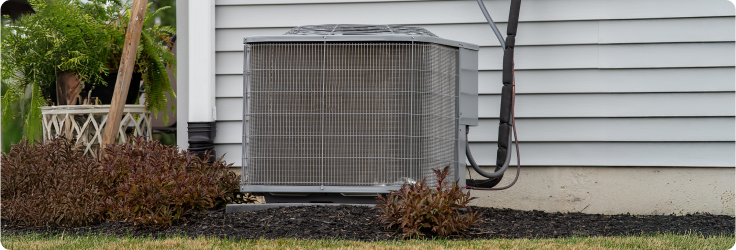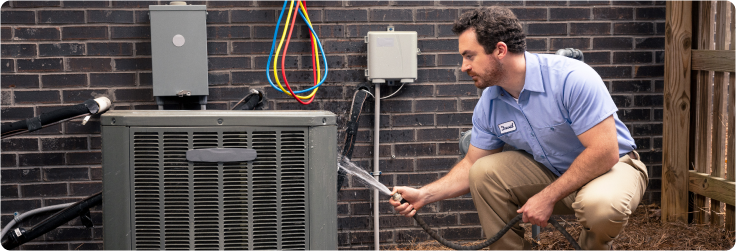Beat the heat with a brand new HVAC
Chill out with big savings when you replace your system through our New HVAC Program.
No one wants to come home on a sweltering summer’s day only to encounter a broken AC. Staying on top of when to change your AC unit—and especially when to look into an American Home Shield AC replacement—means you’ll never run the risk of overheating.
We’re here to answer your most pressing questions about when to replace your AC unit.

Although we wish our HVAC systems could last forever, it’s important to know when to replace an air conditioner unit or its parts. Most AC units last 10 to 15 years, so if yours is getting up there in age, you may want to start researching replacements.
Your cooling system works hard, meaning it’s not a matter of if but how long until you need to replace the HVAC unit. Conducting regular service and maintaining your air conditioner is necessary to keep it in working order—but even with regular care and repairs, it’s simply a matter of time before your air conditioner wears out.
If you’re wondering when to replace an AC unit, you’re not alone. The following warning signs will alert you as to whether your AC unit may be nearing its end. Armed with this information, you can start preparing financially for the inevitable upgrade.
Get a free quote today - Shop Plans

If your air conditioner unit is on the brink, it will let you know. These warning signals may indicate that you need to add “replace AC unit” to your to-do list:
First, consider how old your AC unit is. The older a unit is, the more likely you will need to replace your AC unit. If you have a unit that is 10 years old or older, be sure to check its Seasonal Energy Efficiency Ratio (SEER). The SEER rating indicates how much energy an AC unit will expend over a year.
Since 2023, the U.S. Department of Energy has required a minimum SEER rating of 14 for all new residential AC units “in the northern part of the United States and 15 SEER in the southern part of the United States.” The higher your AC’s SEER rating, the more efficient it is.
In most households, more than 50 percent of home energy use goes towards heating and air conditioning. Although it may be a greater cost up-front, replacing an older unit with a more efficient one that has a higher SEER rating could save you money in the long run.
If you’re wondering how long you have before you need to replace your HVAC unit, keeping an eye on odd behaviors can clue you in before things get serious. Noises coming from your air conditioner can indicate a variety of issues, like a broken part, an unbalanced indoor blower, or other forms of deterioration inside your unit. The specific kind of noise can help you diagnose the problem and determine whether a repair will do the trick or if it’s time for a full replacement.
Strange sounds aren’t the only red flag when it comes to performance. If your home has noticeable hot and cold spots, the system struggles to maintain a consistent temperature, or you find yourself running the system longer than you need to just to feel comfortable, your unit might be losing its ability to do its job efficiently. In cases like this, it might be time to change out your AC for a new, energy-efficient unit.
If your energy bill is suddenly significantly higher, it may indicate that your air conditioner unit is not operating efficiently. Inefficient AC operation is a sign that your unit might be malfunctioning.
Although it’s normal to see increased energy prices during the summer’s hottest days and seasonal heat waves, the ongoing price jumps without corresponding usage changes are a clear indication that something is wrong with your air conditioner. Check out this tool from the Department of Energy to determine your home’s ENERGY STAR score.
In some cases, uneven temperatures throughout the home may be caused by a refrigerant leak. Refrigerant is the substance that absorbs heat from inside your home and releases it outside. When there’s a leak, your system can’t effectively remove heat, putting an added strain on the compressor and other components and leading to more wear and tear over time.
Leaks can also occur in the ductwork itself, letting cool air escape before it ever reaches your living space. If your system is older or experiencing frequent leak-related problems, it might be time to consider whether replacing your AC unit is more cost-effective than continued repairs.
If your AC unit is more than a few years old, there’s a good chance it uses a type of refrigerant that’s already on its way out. R-22, once a go-to refrigerant, was officially banned in the U.S. in 2020 due to its ozone-depleting effects. And now, R-410A—the next-generation replacement for R-22—is also being phased out under the American Innovation and Manufacturing (AIM) Act because of its high global warming potential.
While you're not required to replace an AC unit that still uses these refrigerants, any repair that involves recharging them may get costly. Supplies may become limited, and most newer, eco-friendlier refrigerants like R-32 and R-454B require a totally different system design. So if your AC is aging and struggling to keep up, it might make more sense to invest in a new unit built for the refrigerants of the future.
When your AC unit breaks down, it might seem like replacing individual parts is the most efficient solution. In reality, complex components like compressors or evaporator coils can cost anywhere from $1,000 to over $3,000 to repair or replace. The older your system gets, the more frequent (and frustrating!) those fixes become.
Not sure whether to repair or replace? Try the HVAC industry’s $5,000 rule: Multiply the age of your AC unit by the estimated repair cost.
At a certain point, investing in a new system pays off. With modern AC technology, you'll get better energy efficiency, more reliable performance, and a serious drop in surprise breakdowns.
Chill out with big savings when you replace your system through our New HVAC Program.


The best way to stretch the life of your AC unit—and avoid an untimely replacement—is through regular, thoughtful maintenance. Ideally, you should schedule a professional HVAC tune-up at least once a year. But it’s also possible to do a simple DIY inspection on your own to help your system stay in good shape season after season.
Here are some simple maintenance tips to keep your AC humming:
Changing your air filter every 1–3 months prevents dust buildup and airflow restrictions.
Clearing away leaves, dirt, and debris from the outdoor condenser unit helps it breathe and function properly.
Inspect visible wiring or insulation for wear and tear (just don’t touch anything you’re unsure about!).
Listen for unusual noises or notice any temperature inconsistencies that could be early signs that a repair is needed.
Getting regular tune-ups allows a Pro to check your capacitor or compressor to catch problems like frequent on-and-off cycling.
Even with the best regular maintenance, there will come a moment when it’s time to replace your air conditioner unit completely.
When that day comes, it pays to have American Home Shield in your corner. With home warranty plans that include coverage for ductless, geothermal, wall, and mini-split units, we’ll never let you face the heat alone.
From discounted or free seasonal HVAC tune-ups to trusted local Pros ready to jump in when your unit breaks down due to normal wear and tear, our HVAC warranty coverage helps you stay ahead of covered costly surprises. And if your system can’t be saved, the American Home Shield New HVAC program can help you save thousands on a brand-new unit.*
AHS assumes no responsibility, and specifically disclaims all liability, for your use of any and all information contained herein.